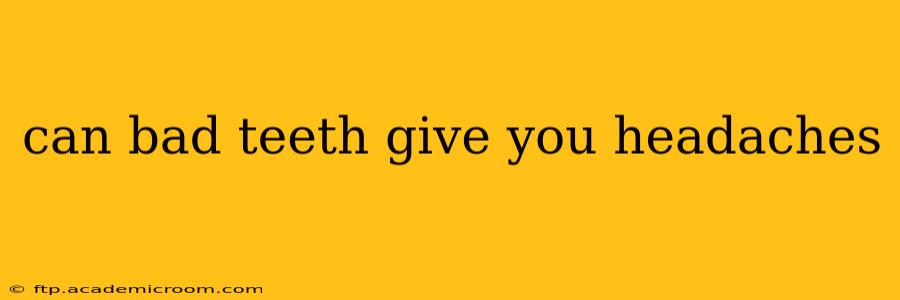Many people experience headaches, but the causes can be surprisingly diverse. While stress and dehydration are common culprits, did you know that problems with your teeth can also trigger headaches? The connection between bad teeth and headaches isn't always obvious, but it's a real and significant one. This article explores the link, explaining how dental issues can lead to head pain and what you can do about it.
How Can Bad Teeth Cause Headaches?
The most common pathway linking poor oral health to headaches is through temporomandibular joint (TMJ) disorders. The TMJ is the joint connecting your jaw to your skull. Problems in this area, often stemming from teeth grinding (bruxism), clenching, or misalignment, can lead to significant pain radiating to the head, temples, and even the neck. This pain can manifest as tension headaches, migraines, or even facial pain.
Beyond TMJ disorders, several other dental problems can contribute to headaches:
- Tooth Infections (Abscesses): Severe infections can cause intense pain that spreads beyond the affected tooth. The inflammation and pressure can trigger referred pain, felt in other areas like the head and temples.
- Sinus Infections: Dental infections can spread to the sinuses, leading to sinus infections that cause pressure and pain in the forehead and around the eyes, often manifesting as headaches.
- Gum Disease (Periodontitis): Chronic inflammation from gum disease can lead to systemic inflammation throughout the body. This can trigger headaches in susceptible individuals.
- Dental Trauma: Injuries to the teeth, jaw, or surrounding structures can lead to immediate and prolonged headaches.
What Types of Headaches Are Linked to Dental Problems?
The type of headache associated with dental problems varies depending on the underlying cause. You might experience:
- Tension Headaches: These are the most common type and are often characterized by a dull, aching pain across the forehead, temples, and back of the head. TMJ disorders are a frequent contributor to tension headaches.
- Migraines: While not directly caused by dental problems in most cases, TMJ dysfunction can trigger or worsen migraines in individuals predisposed to them. The pain is typically more severe and throbbing, often accompanied by nausea and sensitivity to light and sound.
- Facial Pain: Pain localized to the face, jaws, and temples can be a direct result of TMJ problems or dental infections.
How Can I Tell if My Headache Is Related to My Teeth?
Determining if your headache stems from dental issues requires a careful evaluation. Some key indicators include:
- Pain in the jaw or face: Pain concentrated in your jaw, temples, or face, especially when chewing or opening your mouth wide, suggests a possible TMJ problem.
- Sensitivity to touch: Tenderness to the touch around your teeth or jaw can signal an infection or inflammation.
- Jaw clicking or popping: This is a classic symptom of TMJ disorders.
- Headaches worsened by chewing or clenching: If your headaches are worse after eating or during stressful periods, consider the possibility of bruxism.
What Should I Do if I Suspect My Teeth Are Causing My Headaches?
If you suspect a connection between your teeth and your headaches, scheduling an appointment with your dentist is crucial. They can diagnose any underlying dental problems, such as TMJ disorders, infections, or gum disease. Your dentist might recommend treatment options, such as:
- Mouthguards: For bruxism or TMJ disorders.
- Antibiotics: For dental infections.
- Root canal: For severely infected teeth.
- Referrals to specialists: For more complex cases or TMJ-related issues, your dentist may refer you to an orthodontist, periodontist, or oral surgeon.
Can I Prevent Headaches Caused by Bad Teeth?
Preventing headaches related to dental problems involves proactive oral hygiene and regular dental checkups. This includes:
- Brushing and flossing regularly: Maintaining good oral hygiene helps prevent infections and gum disease.
- Regular dental checkups and cleanings: Early detection and treatment of dental problems can prevent them from escalating and causing headaches.
- Stress management techniques: Reducing stress can lessen bruxism and TMJ problems.
- Wearing a mouthguard: If you grind your teeth at night, a mouthguard can protect your teeth and reduce TMJ strain.
Remember, this information is for general knowledge and doesn't replace professional medical advice. Always consult your dentist or doctor for diagnosis and treatment of headaches or any other health concerns. Taking care of your oral health is an important step in maintaining overall well-being and preventing a variety of health problems, including headaches.
